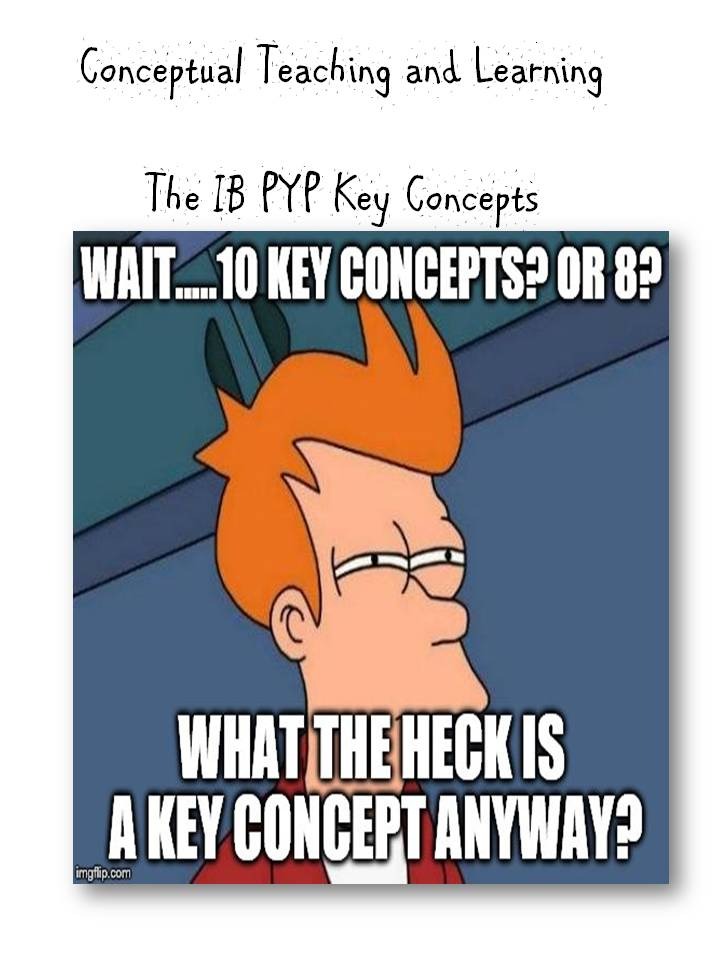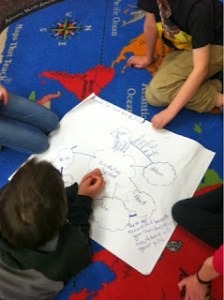Welcome to PYPteachingtools.com
Supporting A Collaborative Classroom in the IB PYP

The very nature of the student led, inquiry based classroom is to amplify the children's voice and bring their thinking to light. As part of 21st century skills, we know that collaboration is a key player in this development of learning. There is no doubt that the process of learning through collaboration is the evolution of expanding understanding. It breaks away from that traditional " I" and "me" method of learning and brings forth the community mindset. We want to build up this sense of collective agency through our culture of community learning.
Why Collaborative Learning?
This form of learning enables a multitude of sub-skills and ALL of the IB PYP Approaches to Learning Skills. It brings meaningful experiences to learning and allows our students to work towards a higher level of thinking as they build upon each others' thoughts and ideas.
- Social skills: Becoming active participants of a social setting presents opportunities for the children to become more effective wit ...
Integrating Inquiry Based Math in the IB PYP

The Inquiry-Based Math Project in the IB PYP
Integrated maths inquiry, concept based maths, project based learning….it doesn’t matter what you call it, well designed projects support learning through a guided inquiry that has enough scope to ensure that maths concepts are approached authentically and with a student-led perspective. These projects naturally lend themselves to support all types and levels of learners. They are transdisciplinary in nature, allowing concepts and skills to be transferred and applied towards an end product that has largely been created with the children's voice as an obvious part of the process. They're open-ended enough to allow your students room to expand and direct the project yet structured enough to support those learners who aren’t quite ready to take that leap into independent inquiry. As you watch the following video, where I share my strategies together with Parvana Guliyeva (an IB PYP grade 4 teacher, currently in Portugal) consider our transd...
Bringing the IB PYP Learner Profile to Life

What kind of a learner are you? Consider the question. Are you more of the lion type of learner or perhaps you're more of the hamster? This is a simple activity that I use at the beginning of the school year, as we are getting to know, not only our class community but also ourselves. As I am building this community of learners, I want them to have a greater understanding of who they are as learners and to recognise and appreciate our diversity. And that, as we know, all stems from the IB Learner Profile. Let's begin with an inquiry into who we are as learners.
 With a simple question and fun images, the children are asked to relate themselves to the pictures. You can choose to use words or simply begin with only the images. This adds to the thinking. I have done it both ways, depending on the students abilities with language, the vocabulary of the PYP and their thinking skills etc. Ask them: Are you more of a lion when it comes to learning, or are you more like the hamsters? Do...
With a simple question and fun images, the children are asked to relate themselves to the pictures. You can choose to use words or simply begin with only the images. This adds to the thinking. I have done it both ways, depending on the students abilities with language, the vocabulary of the PYP and their thinking skills etc. Ask them: Are you more of a lion when it comes to learning, or are you more like the hamsters? Do...
Strategies for Teaching English in IB PYP International Schools

As an international teacher, it is highly likely that you will be teaching English as a second or even third foreign language. In many international schools, we find ourselves with a beautiful broth of multiple languages and cultures within our classrooms. And, we deliver our inquiry-based framework to the children in English. For many others, we are teaching in a host country, to a class full of native speakers from our host country and, again, part of our repertoire is to teach those children to not only speak in English but also to learn in English.
Language therefore becomes more than simply a means of conversation. We are teaching a language, about language and through language and we do all of this with that authentic, inquiry-based approach that we truly believe in. In this article, I will be sharing a recent video from a conversation I had live on Facebook with grade 4 teacher, Maria Vidal. ( @bilingualising on Instagram) [caption id="attachment_2738" align="aligncenter" wi...
Developing Thinkers & Inquirers in the Early Years IB PYP

The early years in the IB PYP can be a whole new experience for teachers new to student-led inquiry. It is a beautiful mix of play-based exploration, guiding invitations leading to inquiry and provoking wonder all led by the children's natural curiosity.
I do not profess to be an expert with this age-group. Having never taught in an early years classroom, it amazes me when I see creative early years teachers working their magic and bringing the elements of the PYP seamlessly into practice with our youngest learners.
Common Challenges
I often hear from early years teacher-facilitators that their challenges include questioning and developing this skill with the children. Such struggles include:
- How do I get the children to ask meaningful questions?
- How can we use thinking strategies with such young children?
- They can't read or write, how do I plan for inquiries?
- They're too young to ask good questions.
Perhaps you can relate to one or a few? Well, I am delighted to be a...
Being An IB PYP Inquiry Teacher

I played around with the title of this article, largely because the job of an IB PYP teacher never looks the same from teacher to teacher. I tried, ' The Role of ....", then, " The Job of.." and finally settled on the above because basically job refers to the content and role refers to the context . Our role and job, I felt, can look quite different depending on the grade level, whereas being brings our own uniqueness to the role which amplifies the job. Make sense? I may be putting too much thought into it. Ha!
Anyway, the most common queries I receive from teachers new to student-led inquiry and the IB PYP is that they are seeking clarity as to how their job ( the content) may differ from their previous teaching positions and what their new role ( the context) , will look like.
Well, rather than simply providing a list like a job description, I created points that summarise what happens as we make that shift from the traditional classroom teacher, to that of becoming a student...
Using the IB PYP Key Concepts


What is A Key Concept?
I was asked recent to show a few of our teachers how I incorporate the key concepts into everyday learning. I felt that there may be a few more of you out there who’d also be interested. So, here we go.
The IB PYP now has 7 key concepts that are designed as the lens or the “big picture”of which we look at our lines of inquiry within each of our six units of inquiry. ( 4 units for EYP)
Integrating Math into an IB PYP Unit of Inquiry


I’m often asked how I integrate maths into our IB PYP units of inquiry. I won’t deny that depending on the unit, it can sometimes be easier said than done. However, I’ve found over the years, that it’s best to keep it relaxed and, if necessary, simply focus on concepts in maths rather than content. Often, especially within the public IB schools in the USA, we are expected to meet certain maths standards by a certain time. This often results in a clash of math units and units of inquiry and a creative juggle ensues. But hey, who doesn’t love a challenge? The rest of the IB world? You’ve got it luckier, I assure you! Anyway, a great resource for math in the beginning of the year is https://www.youcubed.org/. It encourages a maths mindset and is centred around collaborative thinking. It does require signing up for a free account but, once you’re in, you can view the Week of Inspirational Math. This gives you a couple of days of lessons ...
IB PYP Approaches to Learning Skills

It Takes Skills!
The word is well and truly out. The newest hub bub in the IB world is the Approaches to Learning Skills. Formerly known by the International Baccalaureate Organisation as the Transdisciplinary Skills, these are, simply put, a set of skills that we use when we are involved in learning. They come grouped into five sets: Thinking, Social, Self Management, Research and Communication. They naturally have growth mindset occurring within them, since they cover many different behaviours, self control as well as thinking and communication strategies.

As part of your IB PYP classroom, it is usual to see the skills listed somewhere within the room, as posters ( more posters can be found in my store here and also here) and as part of our daily learning objectives. We often refer to those throughout our week and I also like to list them on my daily Learning Objectives boards, tied in with the subject and goals for that day.

By incorporating the skills (as well as the L...
My Favourite Read Alouds for IB PYP Units

I’ve been reflecting lately on the books I’ve used as read alouds throughout our various units of inquiry, that have both reinforced the inquiry as well as integrated many reading skills and strategies. I’ve compiled a list that may help you also, when planning your units of inquiry and aligning them with the elements of the PYP as well as your reading standards. Over the years, I have taught mainly from 3rd grade ( Primary 3/4) up to 6th grade ( Primary 7) and so you’ll find these books to fit the upper elementary age range more.
There is another blog post relating specifically to books that I love when reinforcing the traits of the Learner Profile. You can link to that post here. But this list is more for read alouds that will tie to many of the essential elements of the PYP, as well as slot in nicely to particular Transdisciplinary Themes.
I have created this list for your convenience. You can click on the picture and the title of each book and it will take you directly to its...

